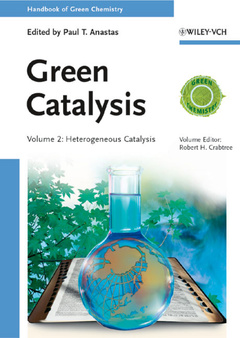Description
Handbook of Green Chemistry, Volume 2
Heterogeneous Catalysis
Handbook of Green Chemistry Series
Director of collection: Anastas Paul T.
Language: English
Keywords
possible; interest; crucial; environmentally; chemistry; world; generation; design; products; reduce; chemical; applications; comprises; green; subjectspecific; heterogeneous; catalysis; biocatalysis; homogeneous; volume; four; central
Publication date: 09-2013
355 p. · 17.5x24.6 cm · Hardback
355 p. · 17.5x24.6 cm · Hardback
Description
/li>Contents
/li>Biography
/li>
The shift towards being as environmentally-friendly as possible has resulted in the need for this important volume on heterogeneous catalysis. Edited by the father and pioneer of Green Chemistry, Professor Paul Anastas, and by the renowned chemist, Professor Robert Crabtree, this volume covers many different aspects, from industrial applications to the latest research straight from the laboratory. It explains the fundamentals and makes use of everyday examples to elucidate this vitally important field.
Zeolites in Catalysis
Sol-gel Sulphonic Acid Silicas as Catalysts
Applications of Environmentally-Friendly TiO2 Photocatalysts in Green Chemistry
Nanoparticles in Green Catalysis
"Heterogreeneous" Chemistry
Surface Bound Heterogeneous Catalysts Via Surface Bound Organometallic and Inorganic Complexes
Sustainable Heterogeneous Acid Catalysis by Heteropoly Acids
TiO2 Based Solar Cells Sensitized by Metal Complexes
Automative Emission Control: Past, Present and Future
Heterogeneous catalysis for hydrogen production
High Throughput Screening of Catalyst Libraries for Emissions Control
Catalytic Conversion of High-Moisture Biomass to Synthetic Natural Gas in Supercritical Water
Sol-gel Sulphonic Acid Silicas as Catalysts
Applications of Environmentally-Friendly TiO2 Photocatalysts in Green Chemistry
Nanoparticles in Green Catalysis
"Heterogreeneous" Chemistry
Surface Bound Heterogeneous Catalysts Via Surface Bound Organometallic and Inorganic Complexes
Sustainable Heterogeneous Acid Catalysis by Heteropoly Acids
TiO2 Based Solar Cells Sensitized by Metal Complexes
Automative Emission Control: Past, Present and Future
Heterogeneous catalysis for hydrogen production
High Throughput Screening of Catalyst Libraries for Emissions Control
Catalytic Conversion of High-Moisture Biomass to Synthetic Natural Gas in Supercritical Water
Series Editor
Paul T. Anastas joined Yale University as Professor and serves as the Director of the Center for Green Chemistry and Green Engineering at Yale. From 2004-2006, Paul Anastas has been the Director of the Green Chemistry Institute in Washington, D.C. Until June of 2004 he served as Assistant Director for Environment at e White House Office of Science and Technology Policy where his responsibilities included a wide range of environmental science issues including furthering international public-private cooperation in areas of Science for Sustainability such as Green Chemistry. In 1991, he established the industry-government-university partnership Green Chemistry Program, which was expanded to include basic research, and the Presidential Green Chemistry Challenge Awards. He has published and edited several books in the field of Green Chemistry and developed the 12 principles of Green Chemistry.
Volume Editor
Bob Crabtree took his first degree at Oxford, did his Ph.D. at Sussex and spent four years in Paris at the CNRS. He has been at Yale since 1977. He has chaired the Inorganic Division at ACS, and won the ACS and RSC organometallic chemistry prizes. He is the author of an organometallic textbook, and editor-in-chief of the Encyclopedia of Inorganic Chemistry and Comprehensive Organometallic Chemistry. He has contributed to C-H activation, H2 complexes, dihydrogen bonding, and his homogeneous tritiation and hydrogenation catalyst is in wide use. More recently, he has combined molecular recognition with CH hydroxylation to obtain high selectivity with a biomimetic strategy.
Paul T. Anastas joined Yale University as Professor and serves as the Director of the Center for Green Chemistry and Green Engineering at Yale. From 2004-2006, Paul Anastas has been the Director of the Green Chemistry Institute in Washington, D.C. Until June of 2004 he served as Assistant Director for Environment at e White House Office of Science and Technology Policy where his responsibilities included a wide range of environmental science issues including furthering international public-private cooperation in areas of Science for Sustainability such as Green Chemistry. In 1991, he established the industry-government-university partnership Green Chemistry Program, which was expanded to include basic research, and the Presidential Green Chemistry Challenge Awards. He has published and edited several books in the field of Green Chemistry and developed the 12 principles of Green Chemistry.
Volume Editor
Bob Crabtree took his first degree at Oxford, did his Ph.D. at Sussex and spent four years in Paris at the CNRS. He has been at Yale since 1977. He has chaired the Inorganic Division at ACS, and won the ACS and RSC organometallic chemistry prizes. He is the author of an organometallic textbook, and editor-in-chief of the Encyclopedia of Inorganic Chemistry and Comprehensive Organometallic Chemistry. He has contributed to C-H activation, H2 complexes, dihydrogen bonding, and his homogeneous tritiation and hydrogenation catalyst is in wide use. More recently, he has combined molecular recognition with CH hydroxylation to obtain high selectivity with a biomimetic strategy.
© 2024 LAVOISIER S.A.S.




